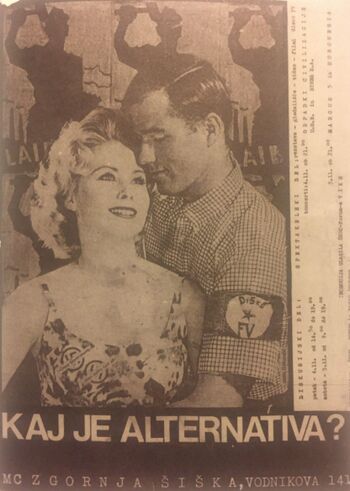Disko FV
Disko FV was a weekly club event combining theatre, punk and new wave music held in Ljubljana from 1981-1985 by the group FV 112/15.
The Disco FV club, its multimedia programme and main venue for subcultural events in Ljubljana has become the symbol of the struggle of the alternative scene for its space because of several forced relocations (Disko Študent (Student) at the Student Campus (1981 ̶ 1983), Dom mladih (Youth Centre) at Zgornja Šiška (1983 ̶ 1984), K4 at Kersnikova (1984 ̶ 1985).
Organisation and production of signature topical programme and club TV: original DJ, music nights, concerts, film and video screenings, multimedia projects, performances, installations, photography exhibitions, Xerox technique and graffiti, wall writings and photo showcase...
Led by the FV group (Zemira Alajbegović, Aldo Ivančić, Neven Korda, Dario Seraval, Goran Devide and others), a multimedia group with a number of colleagues, who also established the independent publishing company for music and video cassettes (FV Recording company) and the FV Video label became the initiator and producer of many video projects. (2017)
Building on their performances as part of Borghesia, "FV members took over the so-called Tuesday evenings in the student discotheque for what was, as they put it, 'a continuation of the theater with other means.' Each Tuesday evening had a precisely conceptualized theme that was performed throughout the evening by FV members in costumes who did all the regular work required of a discotheque staff, from DJ-ing and serving drinks to programming these social-musical-theatrical soirees. Every Tuesday night guests packed the place, a smoky basement where musicians, writers, performers, and professors carried on until breakfast. For alternative artists of all kinds, many of whom got their first chance to present their work in public at Disko FV, this was the place to be. Thus on a typical Tuesday night at Disco FV, performances took place within performances, and audience performed for audience. ... Most of the famous Ljubljana punk bands were presented for the first time in Disko FV. Laibach performed there soon after its first public appearance in Trbovlje in 1980." (Čufer 2003)
The "shows were based on a demand for totality between the space, the action, and the public. The public had to enter the action itself, to come onto the stage, so to speak, and the stage was the entire club." (Korda 2008)
The group FV 112/15 (1980-1983) consisted of Rodoljub Čolaković-Šilja, Sergej Hrvatin, Nerina Kocjančič, Anita Lopojda, Siniša Lopojda, Mirela Miklavčič, Bojana Vajt, as well as Zemira Alajbegović, Goran Devide, Aldo Ivančić, Neven Korda and Dario Seraval. (Orel 2023: 98n101)
The FV in the name represent the initials for Franc Verbinc, the author of one of the most frequently used local dictionaries, the Slovenian Dictionary of Foreign Words. On page 112, entry 15, is the following statement: "c'esc la guerre!/fr. vojna je, cako je pač v vojni" [It is war, that's how it is in war.].
Films
- Disko FV 82-83, dir. Neven Korda, 1983, 42 min.
- Staro in novo [Old and New], dir. Neven Korda and Zemira Alajbegović (ZANK), 1997, 66 min.
Publications
- "Alternativni spektakli: FV 112/15. Pogovor z Zemiro Alajbegović in Nevenom Kordo", Problemi 20:226, 1982, pp 42-48. (Slovenian)
- Eda Čufer, "Between the Curtains: New Theater in Slovenia, 1980-1990", in Impossible Histories: Historical Avant-gardes, Neo-avant-gardes, and Post-avant-gardes in Yugoslavia, 1918-1991, eds. Dubravka Djurić and Miško Šuvaković, MIT Press, 2003, pp 388-391. (English)
- Nina Peče, "FV. Alternativna kulturno-umetniška produkcija", Ljubljana: Univerza v Ljubljani: Fakulteta za družbene vede, 2003. Master's thesis. (Slovenian)
- FV: alternativa osemdesetih / Alternative Scene of the Eighties, ed. Breda Škrjanec, intro. Lilijana Stepančič and Breda Škrjanec, Ljubljana: Mednarodni grafični likovni center, 2008. Exh. cat. Exhibition. [1] (Slovenian)/(English)
- Neven Korda, "Alter Zore" / "Alternative Dawns", pp 29-80, 281-343.
- Nikolai Jeffs, "FV in 'Tretja scena' 1980-1990" / "FV and the ‘Third Scene’, 1980–1990", pp 101-200, 345-394.
- Petja Grafenauer Krnc, "Poišči me v vlažni kleti", pp 201-220.
- Rok Vevar, Jasmina Založnik, "Punkovske metamorfoze", Maska 183-184: "Autonomija plesu", Summer 2017, pp 68-81. (Slovenian)
- "Metamorphic Punk", Maska 183-184: "Autonomy to Dance", 2017, pp 82-95. (English)
- Marta Rendla, "Alternativna kulturna gibanja in »konglomerat FV« v osemdesetih letih v Sloveniji", Prispevki 58:2, 2018, pp 139-159. (Slovenian)
- Club Scene Ljubljana – New York, video, SCCA-Ljubljana, 2020, 96 min. A conversation between Zemira Alajbegović and Jake Yuzna about the club scenes in Ljubljana and New York in the 80s and 90s, about self-organization and collective action. (English)
- Katja Praznik, Art Work: Invisible Labour and the Legacy of Yugoslav Socialism, University of Toronto Press, 2021, pp 119-122. (English)
- Delo umetnosti. Nevidno delo in zapuščina jugoslovanskega socializma, Ljubljana: Maska, 2023. (Slovenian)
- Barbara Orel, Prekinitve s tradicijo v slovenskih uprizoritvenih umetnostih 1966-2006, Ljubljana: Znanstvena založba Filozofske fakultete Univerze v Ljubljani, 2023, pp 98-102. (Slovenian)
- Slovenski punk in fotografija / Slovenian Punk & Photography: Overview Exhibition: Aspects of the Slovenian Punk Movement in Photography from 1977 to the mid-1980s, as well as the Period before and after Punk, eds. Marina Gržinić and Jovita Pristovšek, Ljubljana: ZRC SAZU, Založba ZRC, Dec 2023, 125 pp. Exh. cat. Exhibition. Conference. Publisher. Interview. (Slovenian)/(English)
- Daša Tepina, Petja Grafenauer, "Art and Revolt: From the Socialist Republic of Slovenia to Today", Anthropos 56:1, 2024, pp 37-58. [2] (English)
